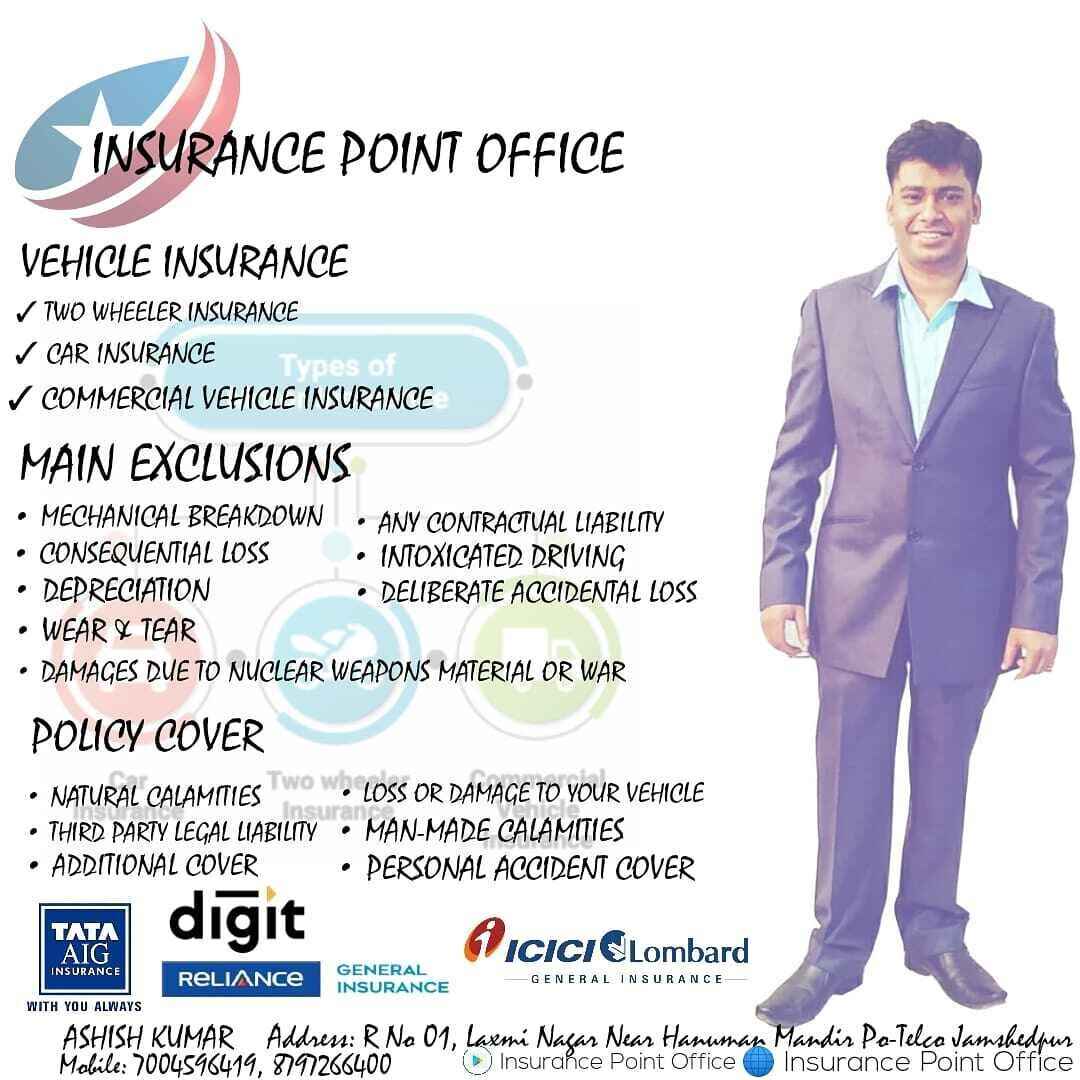

Why people need a insurance advisor?
-
Is an insurance advisor a good job?
A person's interests, abilities, and professional objectives are just a few of the variables that determine whether or not being an insurance advisor is a successful job. Here are some considerations to help you assess whether becoming an insurance advisor is a good fit for you:
-
Flexibility: Being an insurance advisor often offers flexibility in terms of work hours and schedule. You might be able to choose your own hours and work from anywhere, including your home or while on the road.
-
Income Potential: Insurance advisors typically earn commissions and bonuses based on the policies they sell and the premiums generated. The financial potential can be substantial, particularly if you are able to develop a sizable clientele and close a lot of policies.
-
Helping Others: As an insurance advisor, you have the opportunity to help individuals and families protect themselves financially by providing them with appropriate insurance coverage tailored to their needs. Knowing that you are raising people's quality of life could be completed by helping them lower risks and secure their future.
-
Continuous Learning: The insurance industry is dynamic and constantly evolving. For insurance advisor its essential to Keeping up with changes in insurance products, regulations, and market developments. If you appreciate learning new things and being up to date on financial goods and services, this part of your employment may be interesting. Prospective Networking: Establishing connections with customers, insurance providers, and other industry experts can yield significant prospects for networking. You have to Increasing your insurance sector relationships To build your clientele, expand your business, and enhance your professional position.
-
Challenges and Competition: Like any sales-oriented job, being an insurance advisor comes with its challenges, including competition from other advisors, meeting sales targets, and handling rejection.
-
Regulatory Requirements: Depending on your location and the type of insurance products you sell, you may need to obtain licenses or certifications to work as an insurance advisor. Maintaining your trust and legality in the business requires being up to date on regulatory regulations and compliance standards.
All things considered, for people who like helping others, have excellent interpersonal and sales skills, and are prepared to put in the work to establish and sustain client relationships, becoming an insurance adviser may be a gratifying and financially rewarding job. You should know the role's requirements, review your abilities and interests, and determine whether it is a good fit for you or not Before choosing a job as an insurance advisor.
-
How does insurance advisor earn?
Insurance advisers, often known as insurance agents or brokers, are generally compensated through commissions and incentives depending on the insurance policies they sell and the premiums collected. Here's how insurance advisors earn:
-
Commissions: Insurance advisors receive commissions from insurance companies for each policy they sell. The commission amount is usually a percentage of the premium paid by the policyholder. The commission rate may vary depending on the type of insurance policy, the insurance company, and other factors. Commissions can be paid as an upfront lump sum or as ongoing payments over the duration of the policy (renewal commissions).
-
Bonuses: In addition to commissions, insurance advisors may also earn bonuses and incentives from insurance companies based on their performance, such as meeting sales targets, achieving certain production levels, or selling specific insurance products. Additional revenue and prizes to high-performing advisers are given as a bonuses.
-
Renewal Commissions: For insurance policies that have renewal premiums, insurance advisors may continue to earn commissions on the policy's renewal premiums as long as the policy remains in force. Renewal commissions give continued revenue to advisers for the life of the insurance term.
-
Cross-Selling and Upselling: Insurance advisors may have the opportunity to earn additional income by cross-selling or upselling other insurance products or services to existing clients. For example, an advisor who sells auto insurance may also offer home insurance, life insurance, or other types of insurance coverage to the same client, earning additional commissions on those sales.
-
Contingent Commissions: Some insurance companies offer contingent commissions or profit-sharing arrangements to insurance advisors based on the overall profitability of the business written by the advisor or agency. These contingent commissions are typically paid out annually or periodically based on predefined performance metrics and profitability targets.
-
Fee-Based Services: In addition to earning commissions from insurance sales, some insurance advisors may offer fee-based services, such as financial planning, risk management consulting, or insurance advisory services, for which they charge clients a fee separate from the insurance premiums. This fee-based approach allows advisers to diversify their income streams while also providing extra value-added services to their customers.
The volume and kind of insurance policies sold, the commission rates offered by insurance firms, the advisor's performance and sales abilities, and the level of competition in the insurance market are some of the factors that might affect an advisor's overall earnings.
In addition to offering their clients essential insurance products and services, a prosperous insurance consultant may earn a substantial income from commissions, bonuses, and other benefits.
-
What is the difference between insurance agent and advisor?
Although the phrases "insurance advisor" and "insurance agent" are sometimes used interchangeably, their meanings might vary somewhat according on the situation. Here's the typical distinction between the two:
-
Insurance Agent:
- An insurance agent is a licensed professional who represents one or more insurance companies and sells insurance products and services on behalf of those companies.
- Insurance agents typically work directly for an insurance company or are affiliated with an insurance agency or brokerage.
- Insurance products such as life, health, vehicle, and property and casualty insurance might be the focus of an agent's specialization.
- The main goals of agents are to distribute and sell insurance products.
- Based on the insurance policies they sell and the premiums they produce, agents are paid commissions and incentives.
-
Insurance Advisor:
- An insurance advisor is a broader term that encompasses professionals who provide advice, guidance, and expertise on insurance-related matters to individuals, businesses, or organizations.
- Insurance brokers, consultants, financial planners, and other experts providing insurance-related services can also be considered insurance advisers in addition to insurance agents.
- All financial counsel and planning, including insurance, risk management, retirement, investment, and estate planning our done by advisor.
- Always check that policy should have maximum risk coverage, and financial objectives before offering appropriate insurance choices for their specific situations.
- Insurance advisors may work independently or as part of a financial advisory firm, insurance brokerage, or wealth management firm.
- Insurance consultants may charge for their advisory services in addition to receiving commissions from insurance sales, such as fees for financial planning or advising.
Conclusively, insurance advisors provide broader financial guidance and support, encompassing insurance planning, as part of a comprehensive financial planning procedure, whereas insurance agents often focus on marketing insurance products on behalf of insurance companies. Depending on their unique job activities and the services they provide, insurance agents and advisers may have overlapping tasks and responsibilities.
-
What is the qualification for insurance agent?
The criteria for becoming an insurance agent differ by nation and the unique legislation regulating the insurance sector in that jurisdiction. However, here are some general credentials and actions commonly necessary to become an insurance agent:
-
Educational Requirements: In many countries, a high school diploma or equivalent is the minimum educational requirement to become an insurance agent. Some insurance companies may prefer candidates with a college degree or relevant coursework in business, finance, economics, or related fields.
-
Licensing: Insurance agents must obtain a license from the regulatory authority or insurance department in the state or country where they intend to sell insurance products. One must complete pre-licensing coursework, pass a licensing test, and fulfill other eligibility requirements including background checks to obtain a license.
-
Pre-Licensing Education: Candidates for insurance agent licensure are usually required to complete a specified number of hours of pre-licensing education courses approved by the regulatory authority.
-
Licensing Exam: After completing the pre-licensing education requirements, candidates must pass a licensing exam administered by the regulatory authority or an approved testing provider. The test evaluates a candidate's understanding of insurance principles, legal requirements, and moral principles.
-
Background Check: Insurance agent candidates may be subject to background checks, including criminal history checks and financial background checks, as part of the licensing process. Certain criminal convictions or financial issues may disqualify individuals from obtaining an insurance license.
-
Continuing Education: After obtaining a license, insurance agents are typically required to complete continuing education courses on an ongoing basis to maintain their license. Requirements for continuing education make ensuring that agents are up to date on modifications to insurance laws, rules, goods, and market trends.
-
Appointment by Insurance Company: In addition to obtaining a license, insurance agents must be appointed by one or more insurance companies to represent them and sell their insurance products. Appointment requirements may vary depending on the insurance company's policies and procedures.
If someone wants to work as an insurance agent, they must adhere to all legal requirements and conduct study on the particular licensing processes and regulations in their country. Insurance agents may find that developing their sales skills, strong interpersonal and communication qualities, and in-depth understanding of insurance products and services are all beneficial for success in the field.
- What are the insurance agents duties?
As go-betweens for clients and insurance firms, insurance agents are essential to the insurance sector. When it comes to sales, customer service, and compliance it has broad variety of responsibilities. Here are some common duties of insurance agents:
- Sales and Marketing:
- Prospect for potential clients through various channels, such as cold calling, referrals, networking, and lead generation activities.
- Inform customers on benefits, rates, coverage alternatives, and insurance products.
- Risk profiles of clients to recommend suitable insurance solutions and assess the insurance needs.
- Present insurance ideas, quotations, and negotiate terms to fit the client's needs.
- Close sales and facilitate the purchase of insurance policies, ensuring all necessary paperwork is completed accurately and promptly.
- Customer Service:
- Help customers with insurance modifications, updates, and endorsements, such as adding or eliminating coverage, changing contact information, or altering policy limits.
- Process insurance applications, policy renewals, cancellations, and reinstatements in accordance with company policies and procedures.
- Clients can receive assistance with concerns regarding their claims, be guided through the process, and have an advocate working to ensure a fair and timely reimbursement.
- Relationship Building:
- Developing Relationships: Get to know your clients' insurance requirements, preferences, and any life events that could affect those needs.
- Good communication is basic. Listen actively, express yourself clearly, and show empathy.
- Regularly follow up with clients to give further assistance, policy evaluations, and chances for upselling or cross-selling more insurance products.
- Compliance and Ethics:
- Adhere to ethical standards and professional conduct guidelines set forth by regulatory authorities and industry associations.
- Assure adherence to all relevant laws, rules, and license specifications controlling the insurance sector.
- Minimizing operational, financial, and reputational risks.
- Fostering a positive work environment where employees feel valued and respected.
- Professional Development:
- Continuously update knowledge and skills related to insurance products, sales techniques, customer service best practices, and industry developments through training programs, seminars, workshops, and self-study.
- Identifying and developing specific skills relevant to your profession or career goals. This could range from technical skills (e.g., programming languages, design tools) to soft skills.
- Is insurance agent a profession?
Yes, being an insurance agent is considered a profession. A paid job requiring specific training, knowledge, abilities, and ability in a particular sector is sometimes referred to as a vocation. These requirements are met by insurance agents since they complete specialized training, get the necessary licenses, and gain knowledge of insurance services and products to help customers with their insurance needs.
Here are some reasons why being an insurance agent is considered a profession:
- Specialized Training: Insurance agents undergo training and education to acquire knowledge about insurance principles, products, laws, regulations, sales techniques, and customer service practices. They often complete pre-licensing courses and pass licensing exams to obtain the necessary qualifications to work as insurance professionals.
- Licensing Requirements: Insurance agents are required to obtain licenses from regulatory authorities or insurance departments in the jurisdictions where they operate. Agents who get licenses are guaranteed to fulfill specific competency criteria and adhere to ethical and legal obligations in order to operate as insurance professionals.
- Expertise and Skills: Insurance agents learn and develop skills in a range of insurance-related areas, including risk assessment, policy analysis, salesmanship, negotiation, communication, and client relationship management. to educate clients, recommend suitable insurance plans, and provide top-notch client support we have to educate them.
- Client-Centric Approach: Insurance agents serve as trusted advisors to clients, helping them understand their insurance needs, explore coverage options, and make informed decisions to protect their financial interests And they work to build lasting client relationships through quality service based on trust, integrity, and professionalism.
- Ethical Standards: Insurance agents are expected to adhere to ethical standards and professional conduct guidelines established by regulatory authorities, industry associations, and professional codes of ethics. They are committed to serving the interests of their customers and to maintaining the confidentiality of their customers and will display conduct respectful of all with uplifted integrity and honesty in every contact.
To stay a successful insurance agent and fulfill their obligations in a way that appropriately addresses customers' insurance needs, an interdisciplinary blend of technical competence, abilities, professionalism, and ethical behavior are required for insurance job.
Written By - Insurance Point Office



